German singer, songwriter, and actress Nina Hagen (1955) is known for her theatrical vocals and is often referred to as the ‘Godmother of Punk due to her prominence during the punk and new wave movements in the late 1970s and early 1980s. During her 40-year career, she appeared in several European films.
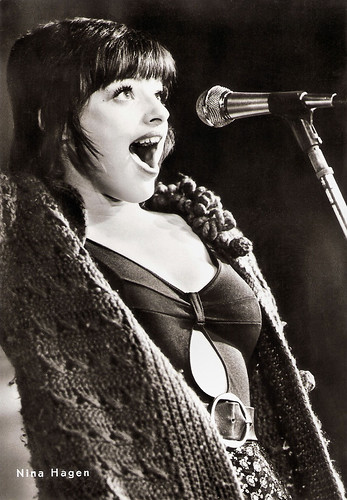
East-German postcard by VEB Progress Film-Verleih, Berlin, no. 147/75. Photo: DEFA.

American postcard by Coral-Lee, Rancho Cordova, no. CL/Personality # 132.
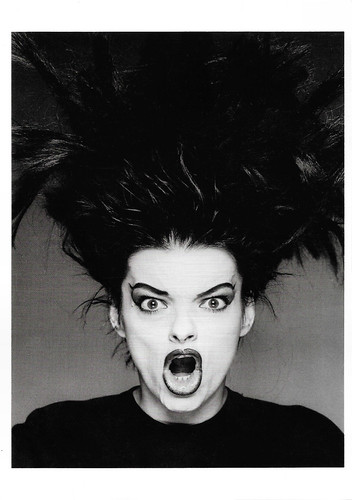
American postcard by Fotofolio, NY, NY, no. F526. Photo: Greg Gorman. Caption: Nina Hagen, Los Angeles, 1995. Proceeds from the sale of this card benefit The AIDS Healthcare Foundation.
Catharina ’Nina’ Hagen was born in 1955) in the former East Berlin, German Democratic Republic. She was the daughter of scriptwriter Hans Hagen and actress and singer Eva-Maria Hagen (née Buchholz). Her paternal grandfather died in the Sachsenhausen concentration camp (her father was Jewish). Her parents divorced when she was two years old, and growing up, she saw her father infrequently.
At age four, she began to study ballet and was considered an opera prodigy by the time she was nine. When Hagen was 11, her mother married Wolf Biermann, an anti-establishment singer-songwriter. Biermann's political views later influenced young Hagen.
Hagen left school at age sixteen and went to Poland, where she began her career. She later returned to Germany and joined the cover band, Fritzens Dampferband (Fritzen's Steamboat Band). She added songs by Janis Joplin and Tina Turner to the ‘allowable’ set lists during shows.
From 1972 to 1973, Hagen enrolled in the crash-course performance program at The Central Studio for Light Music in East Berlin. Upon graduating, she formed the band Automobil and released in 1974 the single 'Du hast den Farbfilm vergessen' (You Forgot the Colour Film), a subtle dig mocking the sterile, grey, Communist state. Nina became one of the country's best-known young stars.
Hagen also appeared in several East-German films and TV films sometimes alongside her mother Eva-Maria Hagen, including Heiraten/Weiblich/Marrying/Female (Christa Kulosa, 1975), Heute ist Freitag/Today is Friday (Klaus Gendries, 1975), Liebesfallen/Love Traps (Werner W. Wallroth, 1976) and Unser stiller Mann/Our Quite Man (Bernhard Stephan, 1976).
Her career in the GDR was cut short after her stepfather Wolf Biermann's East German citizenship was withdrawn from him in 1976. Hagen and her mother followed him westwards to Hamburg. The circumstances surrounding the family's emigration were exceptional: Biermann was granted permission to perform a televised concert in Cologne but denied permission to re-cross the border to his adopted home country.
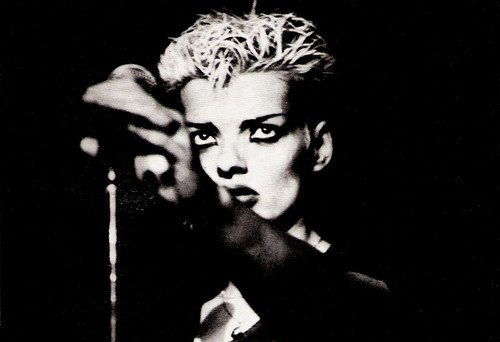
Vintage postcard.
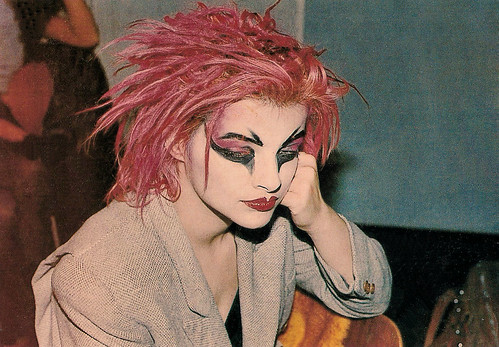
Vintage postcard.
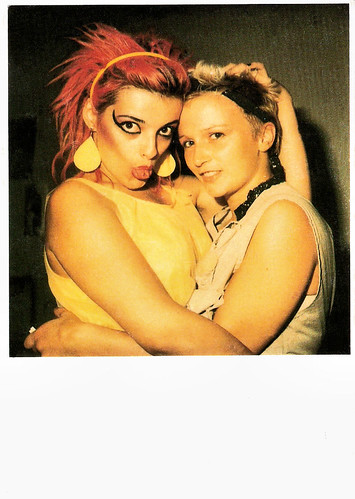
Dutch postcard by Art Unlimited, Amsterdam, no. C 1930. Photo: Bettie Ringma, 1980. Caption: Nina Hagen with Sacha, New York.
Nina Hagen was offered a record deal from CBS Records. Her label advised her to acclimatise herself to Western culture through travel, and she arrived in London during the height of the punk rock movement. Hagen was quickly taken up by a circle that included The Slits and The Sex Pistols. Back in Germany by mid-1977, Hagen formed the Nina Hagen Band in West Berlin's Kreuzberg district. In 1978 they released their self-titled debut album, 'Nina Hagen Band', which included the single 'TV-Glotzer' (a cover of 'White Punks on Dope' by The Tubes, though with entirely different German lyrics), and 'Auf'm Bahnhof Zoo', about West Berlin's then-notorious Berlin Zoologischer Garten station. The album also included a version of 'Rangehn' (Go for It), a song she had previously recorded in East Germany, but with different music.
The album received critical acclaim for its hard rock sound and for Hagen's theatrical vocals, far different from the straightforward singing of her East German recordings. It was a commercial success selling over 250,000 copies. Relations between Hagen and the other band members deteriorated throughout the subsequent European tour. The band released one more album 'Unbehagen' (Unease) before their break-up in 1979. It included the single 'African Reggae' and 'Wir Leben Immer... Noch', a German language cover of Lene Lovich's 'Lucky Number'.
Meanwhile, Hagen's public persona was steadily creating media uproar. She starred in two films. In Germany, she made the experimental film Bildnis Einer Trinkerin/Portrait of a Female Drunkard (Ulrike Ottinger, 1979) with Tabea Blumenschein, Magdalena Montezuma and Eddie Constantine. She also acted with Dutch rocker Herman Brood and Lene Lovich in the Dutch film Cha Cha (Herbert Curiel, 1979). Brood and Hagen would have a long romantic relationship that would end when Hagen could no longer tolerate Brood's drug abuse. She would refer to Brood as her ‘soulmate’ long after Brood committed suicide in 2001.
In late 1980, Hagen discovered she was pregnant, but broke up with the father-to-be, the Dutch guitarist Ferdi Karmelk, who died in 1988. She moved to Los Angeles. Her daughter, Cosma Shiva Hagen, was born in Santa Monica in 1981. In 1982, Hagen signed a new contract with CBS and released her debut solo album 'NunSexMonkRock', a dissonant mix of punk, funk, reggae, and opera. Her first English-language album became also her first record to chart in the United States. She then went on a world tour with the No Problem Orchestra. Her next album the Giorgio Moroder-produced 'Fearless' (1983), generated two major club hits in America. The first was 'Zarah', a cover of the Zarah Leander song 'Ich weiss, es wird einmal ein Wunder geschehen'The second was the disco/punk/opera song, 'New York New York', which reached no. 9 in the USA dance charts.
She followed this with one more album, 'Nina Hagen in Ekstasy' (1985), which featured a 1979 recording of her hardcore punk take on Paul Anka's 'My Way'. The album fared less well and her contract with CBS expired in 1986 and was not renewed. Hagen's public appearances became stranger and frequently included discussions of God, UFOs, her social and political beliefs, animal rights and vivisection, and claims of alien sightings. In 1987 she released the Punk Wedding EP independently, a celebration of her marriage to an 18-year-old punk South African nicknamed 'Iroquois'.
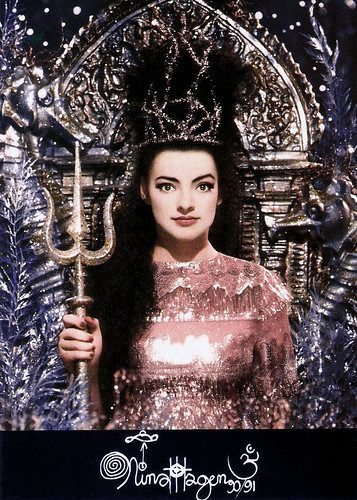
German promotion card by Mercury / Nina Hagen-Fanclub, Erlangen. Image: Pierre et Gilles.
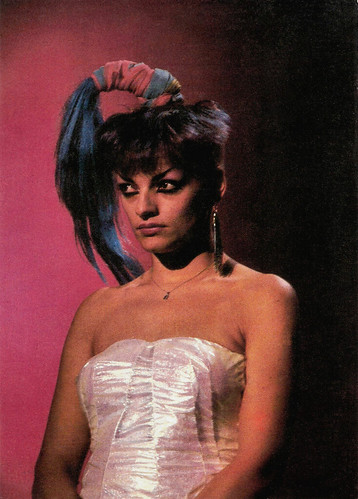
French postcard by Editions F. Nugeron in the Chanteurs series, no. 8. Photo: B. Alary.

German promotion card by Büro Michael Schöbel, Berlin. Photo: Amber Gray. Promotion for the CD 'Big Band Explosion' by Nina Hagen & Leipzig Big Band.
In 1989, Nina Hagen was offered a record deal from Mercury Records. She released three albums on the label: 'Nina Hagen' (1989), 'Street' (1991), and 'Revolution Ballroom' (1993). However, none of the albums achieved notable commercial success. In 1989 she had a relationship with Frank Chevallier from France, with whom she has a son, Otis Chevallier-Hagen (b. 1990). In 1992 Hagen became the host of a TV show on RTLplus. She also collaborated with Adamski on the single 'Get Your Body' (1992).
In the 1990s, Hagen lived in Paris with her daughter Cosma Shiva and son Otis. In 1996, she married David Lynn, who was fifteen years younger, but divorced him at the beginning of 2000. In 1999, Hagen became the host of Sci-Fright, a weekly Science-Fiction show on the British Sci-Fi Channel. That year, she also played the role of Celia Peachum in 'The Threepenny Opera' by Kurt Weill and Bertolt Brecht, alongside Max Raabe. She also appeared as a witch in the German-Russian fairy-tale film Vasilisa (Elena Shatalova, 2000). At IMDb, Howard Roarschawks writes: "I saw this eye-popping film at the 2001 Sarasota Film Festival. I entered the theater without expectations, having chosen the film randomly. From shot one, my jaw dropped slack and my eyes waxed wide. Vasilisa is a gorgeously filmed, brilliantly scripted, boldly acted, confidently directed, lushly designed masterpiece of unseen cinema."
Hagen made her musical comeback with the release of her album 'Return of the Mother' (2000). In 2001 she collaborated with Rosenstolz and Marc Almond on the single 'Total eclipse/Die schwarze Witwe' that reached no. 22 in Germany. Later albums include 'Big Band Explosion' (2003), in which she sang numerous swing covers with her then-husband, Danish singer and performer Lucas Alexander. This was followed by 'Heiß' (Hot), a greatest hits album. The following album, 'Journey to the Snow Queen', is more of an audiobook — Hagen reads the Snow Queen fairy tale with Tchaikovsky's 'The Nutcracker' in the background.
Besides her musical career, Hagen is also a voice-over actress. She dubbed the voice of Sally in Der Albtraum vor Weihnachten, the German release of Tim Burton's The Nightmare Before Christmas (1993), and she has also done voice work on the German animation film Hot Dogs: Wau - wir sind reich!/Millionaire Dogs (Michael Schoemann, 1999). Hagen appeared as the Queen opposite Otto Waalkes and her daughter Cosma Shiva Hagen as Snowwhite in the comedy 7 Zwerge – Männer allein im Wald/7 Dwarves – Men Alone in the Wood (Sven Unterwaldt Jr., 2004) which follows the fairy tale by the Brothers Grimm. It was the second most popular film in German cinemas in 2004, reaching an audience of almost 7 million. She returned in the sequel 7 Zwerge – Der Wald ist nicht genug/Seven Dwarves - The Forest Is Not Enough (Sven Unterwaldt, 2006).
Nina Hagen wrote three autobiographies: 'Ich bin ein Berliner' (1988), 'Nina Hagen: That's Why the Lady Is a Punk' (2003), and 'Bekenntnisse' (2010). She is also noted for her human and animal rights activism. After a four-year lapse, Nina Hagen released the album Personal Jesus in 2010. William Ruhlmann at AllMusic: "Personal Jesus, which featured 13 faith-based tracks that dutifully blend rock, blues, soul, and gospel into a sound that’s distinctly hers." It was followed by Volksbeat (2011). Her latest films are Desire Will Set You Free (Yony Leyser, 2015) with Amber Benson and Rosa von Praunheim and Gutterdämmerung (Bjorn Tagemose, 2016) with Henry Rollins, Grace Jones and Iggy Pop. Her most recent record is 'Unity' (2022), a rock pop album with country and electronic elements and among its themes are biblical miracles and politics.
Nina Hagen performs Du hast den Farbfilm vergessen. Source: PakoChile (YouTube).
Trailer Cha Cha (1979). Source: Thomas Crommentuyn (YouTube).
Nina Hagen performs Zarah. Source: B DPb (YouTube).
Sources: William Ruhlmann (AllMusic), Howard Roarschawks (IMDb), Wikipedia and IMDb.
This post was last updated on 27 July 2024.

East-German postcard by VEB Progress Film-Verleih, Berlin, no. 147/75. Photo: DEFA.

American postcard by Coral-Lee, Rancho Cordova, no. CL/Personality # 132.

American postcard by Fotofolio, NY, NY, no. F526. Photo: Greg Gorman. Caption: Nina Hagen, Los Angeles, 1995. Proceeds from the sale of this card benefit The AIDS Healthcare Foundation.
You forgot the colour film
Catharina ’Nina’ Hagen was born in 1955) in the former East Berlin, German Democratic Republic. She was the daughter of scriptwriter Hans Hagen and actress and singer Eva-Maria Hagen (née Buchholz). Her paternal grandfather died in the Sachsenhausen concentration camp (her father was Jewish). Her parents divorced when she was two years old, and growing up, she saw her father infrequently.
At age four, she began to study ballet and was considered an opera prodigy by the time she was nine. When Hagen was 11, her mother married Wolf Biermann, an anti-establishment singer-songwriter. Biermann's political views later influenced young Hagen.
Hagen left school at age sixteen and went to Poland, where she began her career. She later returned to Germany and joined the cover band, Fritzens Dampferband (Fritzen's Steamboat Band). She added songs by Janis Joplin and Tina Turner to the ‘allowable’ set lists during shows.
From 1972 to 1973, Hagen enrolled in the crash-course performance program at The Central Studio for Light Music in East Berlin. Upon graduating, she formed the band Automobil and released in 1974 the single 'Du hast den Farbfilm vergessen' (You Forgot the Colour Film), a subtle dig mocking the sterile, grey, Communist state. Nina became one of the country's best-known young stars.
Hagen also appeared in several East-German films and TV films sometimes alongside her mother Eva-Maria Hagen, including Heiraten/Weiblich/Marrying/Female (Christa Kulosa, 1975), Heute ist Freitag/Today is Friday (Klaus Gendries, 1975), Liebesfallen/Love Traps (Werner W. Wallroth, 1976) and Unser stiller Mann/Our Quite Man (Bernhard Stephan, 1976).
Her career in the GDR was cut short after her stepfather Wolf Biermann's East German citizenship was withdrawn from him in 1976. Hagen and her mother followed him westwards to Hamburg. The circumstances surrounding the family's emigration were exceptional: Biermann was granted permission to perform a televised concert in Cologne but denied permission to re-cross the border to his adopted home country.

Vintage postcard.

Vintage postcard.

Dutch postcard by Art Unlimited, Amsterdam, no. C 1930. Photo: Bettie Ringma, 1980. Caption: Nina Hagen with Sacha, New York.
Nina Hagen Band
Nina Hagen was offered a record deal from CBS Records. Her label advised her to acclimatise herself to Western culture through travel, and she arrived in London during the height of the punk rock movement. Hagen was quickly taken up by a circle that included The Slits and The Sex Pistols. Back in Germany by mid-1977, Hagen formed the Nina Hagen Band in West Berlin's Kreuzberg district. In 1978 they released their self-titled debut album, 'Nina Hagen Band', which included the single 'TV-Glotzer' (a cover of 'White Punks on Dope' by The Tubes, though with entirely different German lyrics), and 'Auf'm Bahnhof Zoo', about West Berlin's then-notorious Berlin Zoologischer Garten station. The album also included a version of 'Rangehn' (Go for It), a song she had previously recorded in East Germany, but with different music.
The album received critical acclaim for its hard rock sound and for Hagen's theatrical vocals, far different from the straightforward singing of her East German recordings. It was a commercial success selling over 250,000 copies. Relations between Hagen and the other band members deteriorated throughout the subsequent European tour. The band released one more album 'Unbehagen' (Unease) before their break-up in 1979. It included the single 'African Reggae' and 'Wir Leben Immer... Noch', a German language cover of Lene Lovich's 'Lucky Number'.
Meanwhile, Hagen's public persona was steadily creating media uproar. She starred in two films. In Germany, she made the experimental film Bildnis Einer Trinkerin/Portrait of a Female Drunkard (Ulrike Ottinger, 1979) with Tabea Blumenschein, Magdalena Montezuma and Eddie Constantine. She also acted with Dutch rocker Herman Brood and Lene Lovich in the Dutch film Cha Cha (Herbert Curiel, 1979). Brood and Hagen would have a long romantic relationship that would end when Hagen could no longer tolerate Brood's drug abuse. She would refer to Brood as her ‘soulmate’ long after Brood committed suicide in 2001.
In late 1980, Hagen discovered she was pregnant, but broke up with the father-to-be, the Dutch guitarist Ferdi Karmelk, who died in 1988. She moved to Los Angeles. Her daughter, Cosma Shiva Hagen, was born in Santa Monica in 1981. In 1982, Hagen signed a new contract with CBS and released her debut solo album 'NunSexMonkRock', a dissonant mix of punk, funk, reggae, and opera. Her first English-language album became also her first record to chart in the United States. She then went on a world tour with the No Problem Orchestra. Her next album the Giorgio Moroder-produced 'Fearless' (1983), generated two major club hits in America. The first was 'Zarah', a cover of the Zarah Leander song 'Ich weiss, es wird einmal ein Wunder geschehen'The second was the disco/punk/opera song, 'New York New York', which reached no. 9 in the USA dance charts.
She followed this with one more album, 'Nina Hagen in Ekstasy' (1985), which featured a 1979 recording of her hardcore punk take on Paul Anka's 'My Way'. The album fared less well and her contract with CBS expired in 1986 and was not renewed. Hagen's public appearances became stranger and frequently included discussions of God, UFOs, her social and political beliefs, animal rights and vivisection, and claims of alien sightings. In 1987 she released the Punk Wedding EP independently, a celebration of her marriage to an 18-year-old punk South African nicknamed 'Iroquois'.

German promotion card by Mercury / Nina Hagen-Fanclub, Erlangen. Image: Pierre et Gilles.

French postcard by Editions F. Nugeron in the Chanteurs series, no. 8. Photo: B. Alary.

German promotion card by Büro Michael Schöbel, Berlin. Photo: Amber Gray. Promotion for the CD 'Big Band Explosion' by Nina Hagen & Leipzig Big Band.
Return of the mother
In 1989, Nina Hagen was offered a record deal from Mercury Records. She released three albums on the label: 'Nina Hagen' (1989), 'Street' (1991), and 'Revolution Ballroom' (1993). However, none of the albums achieved notable commercial success. In 1989 she had a relationship with Frank Chevallier from France, with whom she has a son, Otis Chevallier-Hagen (b. 1990). In 1992 Hagen became the host of a TV show on RTLplus. She also collaborated with Adamski on the single 'Get Your Body' (1992).
In the 1990s, Hagen lived in Paris with her daughter Cosma Shiva and son Otis. In 1996, she married David Lynn, who was fifteen years younger, but divorced him at the beginning of 2000. In 1999, Hagen became the host of Sci-Fright, a weekly Science-Fiction show on the British Sci-Fi Channel. That year, she also played the role of Celia Peachum in 'The Threepenny Opera' by Kurt Weill and Bertolt Brecht, alongside Max Raabe. She also appeared as a witch in the German-Russian fairy-tale film Vasilisa (Elena Shatalova, 2000). At IMDb, Howard Roarschawks writes: "I saw this eye-popping film at the 2001 Sarasota Film Festival. I entered the theater without expectations, having chosen the film randomly. From shot one, my jaw dropped slack and my eyes waxed wide. Vasilisa is a gorgeously filmed, brilliantly scripted, boldly acted, confidently directed, lushly designed masterpiece of unseen cinema."
Hagen made her musical comeback with the release of her album 'Return of the Mother' (2000). In 2001 she collaborated with Rosenstolz and Marc Almond on the single 'Total eclipse/Die schwarze Witwe' that reached no. 22 in Germany. Later albums include 'Big Band Explosion' (2003), in which she sang numerous swing covers with her then-husband, Danish singer and performer Lucas Alexander. This was followed by 'Heiß' (Hot), a greatest hits album. The following album, 'Journey to the Snow Queen', is more of an audiobook — Hagen reads the Snow Queen fairy tale with Tchaikovsky's 'The Nutcracker' in the background.
Besides her musical career, Hagen is also a voice-over actress. She dubbed the voice of Sally in Der Albtraum vor Weihnachten, the German release of Tim Burton's The Nightmare Before Christmas (1993), and she has also done voice work on the German animation film Hot Dogs: Wau - wir sind reich!/Millionaire Dogs (Michael Schoemann, 1999). Hagen appeared as the Queen opposite Otto Waalkes and her daughter Cosma Shiva Hagen as Snowwhite in the comedy 7 Zwerge – Männer allein im Wald/7 Dwarves – Men Alone in the Wood (Sven Unterwaldt Jr., 2004) which follows the fairy tale by the Brothers Grimm. It was the second most popular film in German cinemas in 2004, reaching an audience of almost 7 million. She returned in the sequel 7 Zwerge – Der Wald ist nicht genug/Seven Dwarves - The Forest Is Not Enough (Sven Unterwaldt, 2006).
Nina Hagen wrote three autobiographies: 'Ich bin ein Berliner' (1988), 'Nina Hagen: That's Why the Lady Is a Punk' (2003), and 'Bekenntnisse' (2010). She is also noted for her human and animal rights activism. After a four-year lapse, Nina Hagen released the album Personal Jesus in 2010. William Ruhlmann at AllMusic: "Personal Jesus, which featured 13 faith-based tracks that dutifully blend rock, blues, soul, and gospel into a sound that’s distinctly hers." It was followed by Volksbeat (2011). Her latest films are Desire Will Set You Free (Yony Leyser, 2015) with Amber Benson and Rosa von Praunheim and Gutterdämmerung (Bjorn Tagemose, 2016) with Henry Rollins, Grace Jones and Iggy Pop. Her most recent record is 'Unity' (2022), a rock pop album with country and electronic elements and among its themes are biblical miracles and politics.
Nina Hagen performs Du hast den Farbfilm vergessen. Source: PakoChile (YouTube).
Trailer Cha Cha (1979). Source: Thomas Crommentuyn (YouTube).
Nina Hagen performs Zarah. Source: B DPb (YouTube).
Sources: William Ruhlmann (AllMusic), Howard Roarschawks (IMDb), Wikipedia and IMDb.
This post was last updated on 27 July 2024.
I missed Naturträne and Unbeschreiblich weiblich. ;)
ReplyDelete